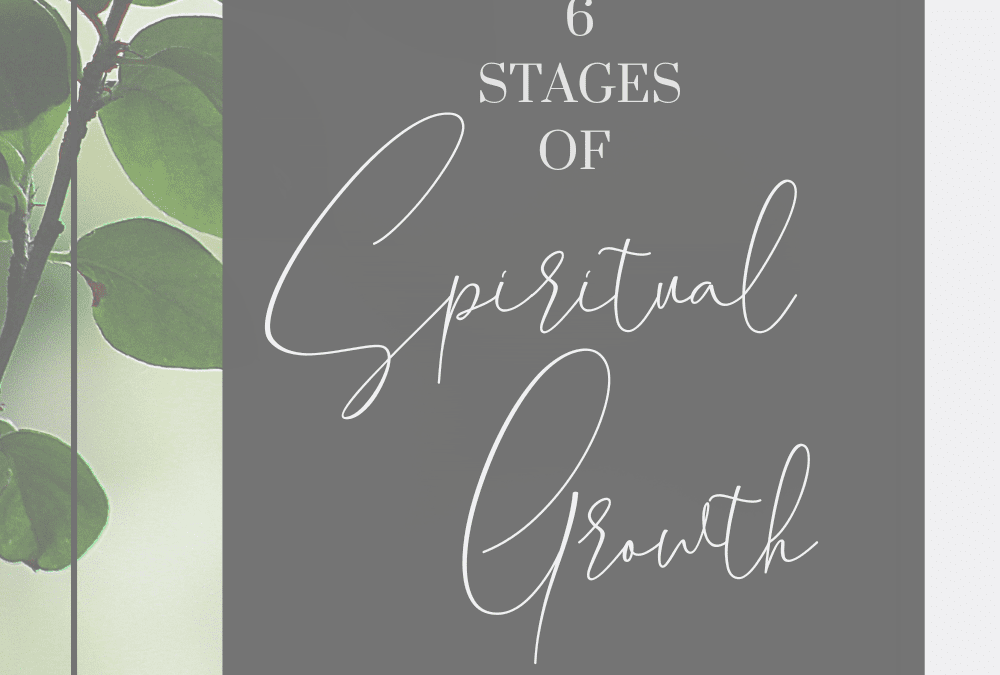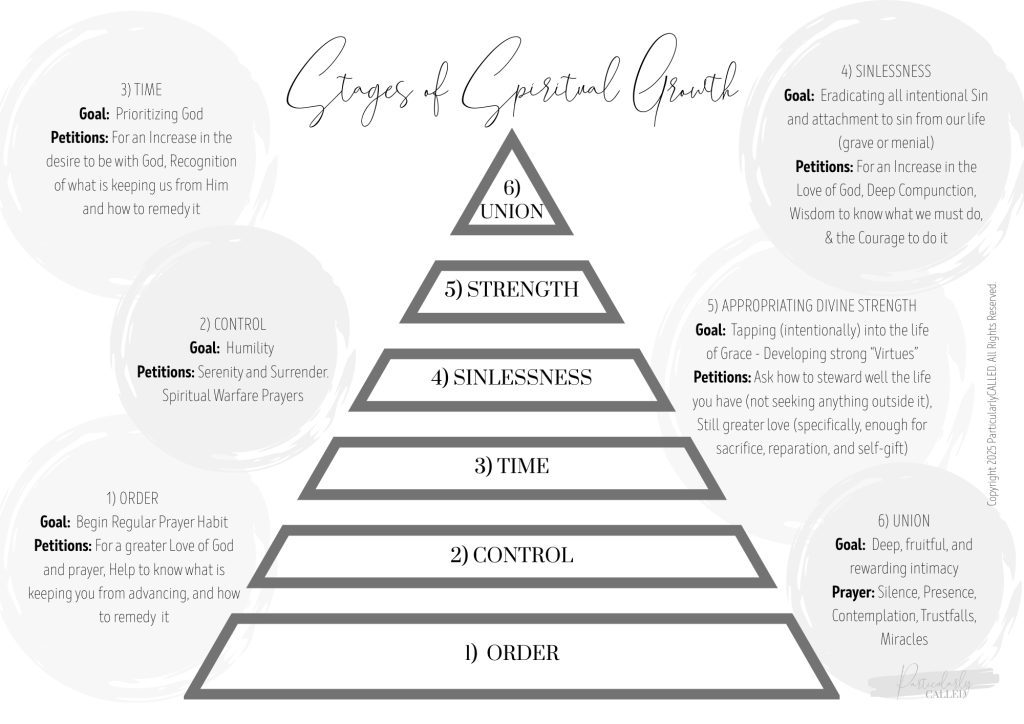Did you know that the secret to growth in the Spiritual Life lies in the structure of our ordinary days?
For some, settling in to ordinary routines after a Summer of whimsical “spontaneity” may seem challenging, but for many it is a happy respite from tumult and indecision. There is something comforting about routine, and the more we surrender to its light yoke, the more we quickly discover that we are created to be creatures of structure.
But what should that structure look like?
Most people who decide they want to make progress in the Spiritual Life seek out direction. It is true that a spiritual director could be helpful, but at the very beginning, what might be even more helpful would be to have a clear picture of the goal and the trajectory. This is a much more simple and effective way to make and gauge tangible progress. Don’t worry, a guide will become more relevant later on (see Step 6).
Before we begin:
Discipline will be the operative word here. Growth and progress in ANY area can never be achieved without discipline. This is not the same as punishment, nor is it a negative or insulting concept. Discipline, similar to Disciple (discipulus), comes from the Latin discere, which means, “to learn”. Obviously, it entails self-control gained by consistently striving to meet high standards of behavior, and the ability to keep working at something that can be challenging, but the word also implies, as its root indicates, thoughts of instruction, teaching, and learning. This is so crucial to the Spiritual Life because the goal of Following Christ means that we to desire to be His disciples – namely, learning from Him and exercising ourselves in pursuit of a deep relationship with Him.
Necessary tools:
Some very valuable tools in this endeavor will include things like strong routines and habit-stacking. We can accomplish anything we work toward gradually and steadily. “Habit stacking” makes us stronger and more productive individuals with a sense of self-respect and self-confidence. Although building each habit may take concentrated effort (discipline 😉) at the beginning, the challenge gives us a sense of accomplishment and improvement and gives our lives a sense of purpose and shape, into which we can then build a strong prayer life. Read: What is a Rule-of-Life & Why you Need one
Our prayer life will be the single most critical element to our Spiritual Growth. Nothing else will matter if we don’t prioritize prayer in every stage of our spiritual growth.
Why?
The enemy, of course, does not want us building prayer into our lives as a permanent and meaningful fixture. Hence, he does all in his power to dissuade us from our good resolutions. This is why it is so important for us to be strong and determined because the presence of spiritual warfare will not discourage the disciplined Christian. (Incidentally, this is also one of the major reasons why other practices that make us stronger as individuals, such as working out, fasting, and other “mortifications“, are so valuable to the Christian life!)
Quick disclaimer:
- The goal of this article is to break something immense into something digestible at a glance. Please don’t think that every possible scenario, outcome, problem, or solution is detailed below. It is designed to be vague enough to apply to extreme variations in life circumstances, yet specific enough to be actionable in the same. For best results, give it some time for contemplation, and apply your best efforts without becoming pharisaical or overly analytical. Practice makes perfect and understanding comes with time.
- It doesn’t really matter where you are in the process as long as you find where you are and move up from there. Honesty (aka. humility) is paramount here! It’s continued motion along a trajectory that matters, rather than how close we are to the goal.
6 Steps to Growth in the Spiritual Life (Spiritual Growth)
Trajectory determines achievement – ParticularlyCALLED
1) Order
Chaos is the enemy of peace. We need order in our lives – Ie. (reasonably) clean, functional, and non-stressful homes, workplaces, and prayer spaces. Our exterior is a mirror of our interior. Much like the concept of “the way you dress is a form of self expression”, the way we live is very telling of the state of our interior selves. Is it cluttered, disorganized, or unhealthy? If so, it is likely your soul is suffering too…
How to fix this?
Take some good time (3-7 days) to be thoughtful and observant, make a list of all the things that are problems (ideally, keep a running list thereafter). Then, decide which problem is the most important and come up with a personalized plan to remedy each one by one.
Note: You don’t have to have a plan for every problem before you start to work on #1. This is an evolving process we learn as we go. The important part is starting. Also, not every plan will be successful. It is important not to let failure get the best of us but simply to analyze what didn’t work and then try again with a new and improved plan. Lastly, old habits die hard; be sure to give yourself enough time to fully accomplish each goal (3 weeks-3 months) and don’t work on too many self-help projects at once. Don’t be afraid to do research, take courses, or get help to accomplish various goals (ie. decluttering or organization).
What should our prayer life look like in this phase?
Short but daily Bible time. Prayer intentions: Help me to desire You. Give me greater love for You and for prayer. Practically speaking: Ask the Lord: What are my problems? Which ones are the biggest? How should I remedy them? and Help me!
Recommended article: Top 10 Essential Habits for a Life of Deep Intimacy with God
2) Control
Conversely, our exterior affects our interior. Maybe you are already a rather disciplined person yourself, but you aren’t completely in control of your exterior. Clearly, for example, our children rarely cooperate with our desire for perfect order and calm, and yet we can’t just give up and assume God doesn’t want us to grow spiritually if He gave us a challenging life. Maybe your actual, physical home is not your own and you have little control over what it looks like, but, when chaos reigns, our internal world will necessarily also feel chaotic. We must fix what we can to make our spaces conducive to maintaining a strong spiritual life. This is why monasteries, for example, have always focused on beauty, cleanliness, order, and simplicity (notice, not for their own sakes, but for the sake of being able to have an orderly interior life as well).
This is the step where, despite our best efforts, we begin to realize that not everything is necessarily within our control. This includes all the forces against which we must war in the Spiritual Life, commonly referred to as “the world, the flesh, and the devil”. Here is where the popular Serenity Prayer and the Surrender Novena will be helpful as well as Sacramentals and even Binding Prayers for serious situations.
3) Time
Once our exterior is at least beginning to take shape, then we need to look also at our time management, which, if you think about it, is also an element of our exterior which affects our interior, just not quite as visible.
Every choice is a statement of priorities – ParticularlyCALLED
For single people, the discerning questions here are quite simple (For families, simply replace all the I’s with we’s):
How do I spend my time? Do my priorities grow my closeness with Christ, or do they distract me from Him? Am I simply doing too much? Am I too busy for God? How much time do I spend with God? How can I increase this? What things are keeping me from God?
Prayer here looks like:
Lord, increase my desire to be with You. Help me to order my life around You. Show me what is keeping me from You. And, How can I better fine tune my priorities?
4) Sinlessness
Now we need to examine our lives for sin. Not surprisingly, many sins we may have been struggling with might begin disappearing as we intentionally work on the first three areas. Now check yourself to see if there is any remaining areas that are – ahem – uncomfortable. If someone came to search your soul, are there any places you would rather them not see? Anything you wouldn’t be proud to show your mother? or God? (even if you can’t explain why)
Begin to research what sin is, why it is bad, why you should care, and what are the tools at your disposal to help you get rid of it. Hint: They exist!
Again, be methodical. Observe your patterns, make a list of problem areas, decide which is the most problematic, and begin there. Eliminate sources first of temptations, ask for the grace of repentance (compunction), then beg pardon, and actually break the chains they have on you.
Hint: This is the principle purpose of the words “te absolvo ab omni vinculo…”, in the Latin, the words of absolution literally mean, “I dissolve the bonds/chains…” that this sin holds over you. This is so desperately important because, alone we are incapable of breaking the power that sin holds over us as a result of concupiscence (the Fall). However, this is the grace and purpose of Confession (in addition to tangible forgiveness, obviously), and why Catholics here have an indisputable advantage over other denominations once you arrive at this point in the journey. It is not enough just to be sorry or to say sorry – which we can and should do, obviously, to God in the private of our own hearts – but, such private cultivation of remorse is only further motivation for the actual Sacrament if we truly wish to break patterns and strongholds.
Recommended Article: Is it possible to stop sinning? (Not about Confession!)
5) Grace and (Divine) Strength (“Virtue“)
Now we can begin to make real progress! With nothing holding us back, this is where we begin to make real strides toward deep intimacy with God.
This is where we examine our state-in-life and decide which strengths we most need to develop in order to do our job (aka. serve God/steward our lives) as well as possible. But, as most of us have probably realized, this is hard!
It may be helpful to understand that the word virtue comes from the Latin word virtus meaning strength, but not just any strength, no, this is manly (virile) strength, or the strength of God. This is where Grace comes in! We know we need strength to steward the life God gave us well, and (at this point) we are becoming more and more aware of our inability to do this on our own. That’s what Grace is for! It is the divine life that desires to flow through our veins (John 15:1-8) to help us accomplish the impossible (Matthew 19:26).
but He said to me, “My grace is sufficient for you, for power is made perfect in weakness.” So, I will boast all the more gladly of my weaknesses, so that the power of Christ may dwell in me. – 2 Corinthians 12:9
The Strength/Virtue step is especially important because “grace builds on nature“. Your WILLINGNESS to take action and pursue Divine strength is what counts.
Now, we cannot maintain a trajectory, especially a challenging one, without knowing why we do it. Our WHY gives us our motivation to continue on. Our why is Love. Love of God and love of others. In that order! (Matthew 22:36-40)
Practically Speaking:
This stage will look like the development of different strengths, one-by-one. “Habit-stacking” virtues so to speak. (primarily dictated by whatever we most need, wherever we are). ie. How well can you live the life God gave you, the life that is in front of you right now? What strengths do you need to develop? Which are the most important? ie. Would it help you to wake up earlier to get more time for uninterrupted prayer? Do you need to be more patient? more wise? more discerning? more kind? more temperate?
The goal here is very simple: to learn to recognize grace, pursue grace, and cooperate with grace. That’s it. This is NOT, How can I change my life to be more impressive? or What should I do OUTSIDE my life? But, rather, How do I do the life I already have with all my might? It’s only when something falls into that life that enhances it or builds on it rather than taking from it, that you should jump at the opportunity. Our callings are found not so much in improving, seeking, deciding, or taking, as they are in receiving, accepting, and stewarding what we are given.
6) Union
Lastly, continue eliminating as many things as possible from your life to make more time/space for God (not things required by your state-in-life). Prayer is life and the more prayer you have the more grace (strength) you have for everything else. The more you do, the more prayer you need to sustain it. Remember, He is our food, our strength, our drink, our rest, our everything! Pray more! Increase the silence in your life. Think about God. Spend TIME with Him sitting and saying nothing. Listen more. Read and study. DISCOVER more about God. Practice trustfalls (you will know them when you see them). Pay attention to what it looks like to do this life alongside God and you will begin to see incredible miracles.
It is only once you’ve arrived at this step and you are finding yourself “without direction” that you may decide you wish to consider praying for the Lord to help you find a good spiritual director.
Final notes:
As the visual shows, this process is more of a crescendo than a line. Advancing in the Spiritual Life does not diminish the value or importance of the first steps, but rather heightens them. Essentially, all of the steps overlap at any given time, much like a target (2D imagery) or a tower/pyramid (3D imagery). The first levels don’t go away when you move to the next one(s), they merely become the backdrop or the foundation of the subsequent steps. You will have to continue keeping them up the same way you have to keep cleaning once you’ve built a house, or like using the basic operations (+,-,×,÷) once you arrive at Advanced Mathematics.
My prayer for you is that you discover exactly where you struggle most in this spectrum in order to know precisely where to focus your energies…. for it is then that you will begin to see incredible growth.
Our calling is simply to the area of our greatest weakness. -ParticularlyCALLED
To finally gaining tangible ground (and bearing good fruit)!
🥂
Always,
<3



